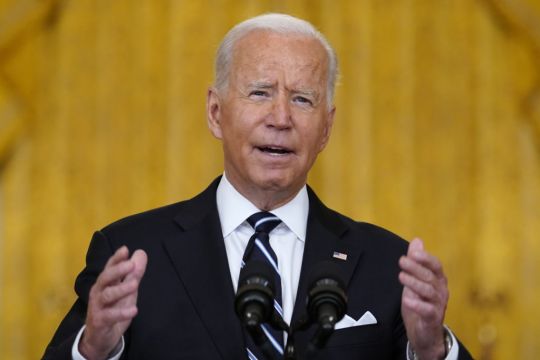President Joe Biden has said he is committed to keeping US troops in Afghanistan until every American is evacuated even if that means maintaining a military presence beyond his August 31 deadline for withdrawal.
He also hit back at criticism that the US should have done more to plan for the evacuation and withdrawal, which has been marked by scenes of violence and chaos as thousands attempted to flee while the Taliban advanced.
In an interview with ABC News, Mr Biden said the US will do “everything in our power” to evacuate Americans and US allies from Afghanistan before the deadline.

Pressed repeatedly on how the administration would help Americans left in the nation after August 31, Mr Biden said: “If there’s American citizens left, we’re gonna stay till we get them all out.”
Earlier, Defence Secretary Lloyd Austin said the US military does not have the capacity to deploy forces beyond the perimeter of Kabul airport in order to evacuate more civilians from Afghanistan,
Afghans and aid organisations have said that citizens are having problems getting past the Taliban and into the airport in a mass exodus triggered by the insurgents’ rapid takeover of the country and its capital on Sunday.
Mr Austin told reporters at a Pentagon press conference on Wednesday that the US is working to get as many people through the evacuation process and out of the country as quickly as possible but “we’re not close to where we want to be”.
The Pentagon has said that about 5,000 civilians have been flown out of Afghanistan so far but officials want to evacuate a maximum of 9,000 people a day.
Mr Austin said that securing the airport is the paramount mission and he does not want to do anything to detract from that.

He said the US military does not have the capability to go out and collect large numbers of citizens and get them to the airport.
“I don’t have the capability to go out and extend operations currently into Kabul,” Mr Austin said. “And where do you take that? How far do you extend into Kabul, and how long does it take to flow those forces in to be able to do that?”
Mr Austin, a retired four-star Army general who commanded forces in Afghanistan, spoke at his first Pentagon news conference since the Taliban swept to power in Kabul on Sunday.
He said he was mainly focused on the airport, which faced “a number of threats” that must be monitored.
“We cannot afford to either not defend that airfield or not have an airfield that’s secure, where we have hundreds or thousands of civilians that can access the airfield,” he said, adding that talks with the Taliban were continuing to ensure safe passage for those evacuating.
He said there were about 4,500 US troops at the airport, maintaining security to enable the State Department-run evacuation operation that has been marked by degrees of chaos and confusion.
He said the State Department was dispatching more consular affairs officers to speed up the processing of evacuees.
“We’re not close to where we want to be” in terms of the pace of the airlift, he said.
Senior US military officers were talking to Taliban commanders in Kabul about checkpoints and curfews that have limited the number of Americans and Afghans able to enter the airport.
Those US officers included Navy Rear Admiral Peter Vasely, said John Kirby, the chief Pentagon spokesman.
Mr Kirby said that over 24 hours about 2,000 people, including 325 American citizens, had left aboard 18 flights by US Air Force C-17 transport planes.
The number of departing Air Force flights was likely to be similar in the coming 24 hours, Mr Kirby said, although he said he could not estimate how many people they would carry.
“Military flights are arriving and departing consistently and there is limited commercial flight operations, as well as some foreign contracted flights that are coming and going,” he said.
The spokesman said the Biden administration was considering its options for dealing with a separate but related problem — the abandonment by Afghan security forces of an array of military equipment, weapons and aircraft that have fallen into the hands of the Taliban or other militant groups.
“We don’t, obviously, want to see our equipment in the hands of those who would act against our interests or the interests of the Afghan people and increase violence and insecurity inside Afghanistan,” Mr Kirby said. “There are numerous policy choices that can be made, up to and including destruction.” He said those decisions had not yet been made.







